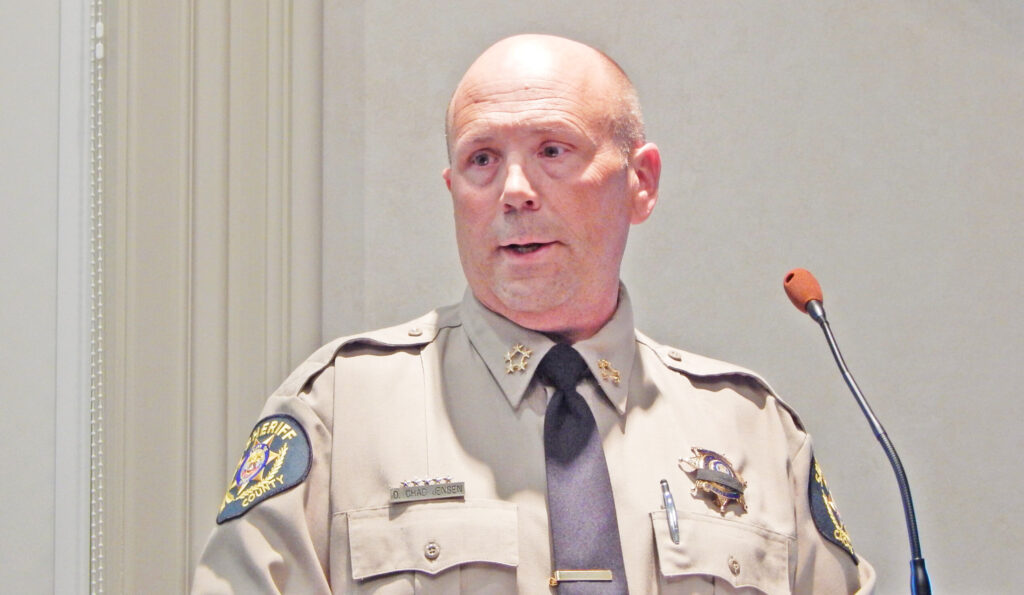During a report to members of the Cache County Council on Nov. 11, County Sheriff Chad Jensen predicted improved cooperation between law enforcement and lawmakers during the upcoming general session of the Utah Legislature.
CACHE COUNTY – Cache County’s sheriff expects to see improved communication between law enforcement officials and lawmakers during the upcoming 2022 general session of the Utah Legislature.
“We’re in better shape this year, as far as law enforcement goes, than we were last year,” said Sheriff Chad Jensen in a report to the members of the Cache County Council on Jan. 11.
Jensen explained that, out of about 1,600 bills filed during the 2021 general session of the Legislature, there were about 215 proposals that would have affected law enforcement and public safety.
“Out of that 215 bills, 35 or 40 of them got passed,” the sheriff added. “We had a hand in saying what most of those bills looked like in the end.
“We were also able to kill a whole lot of those proposals before most of them even saw the light of day.”
By “we,” Jensen meant the members of the Utah Sheriffs’ Association (USA). Jensen serves as president of that non-profit group representing the interests of Utah’s 29 sheriffs and their deputies.
But even the influence of the USA was not sufficient to bring resolution to one of their top priorities – bail reform – during the 2021 general session of the Legislature.
When state lawmakers passed legislation creating the controversial Justice Reinvestment Initiative in 2014, their goal was to reduce Utah’s prison population and increase drug treatments programs.
Although Utah’s rates of incarceration and violent crime are among the lowest in the country, according to state Sen. Chris Wilson (R-District 25), the state’s prison population had grown by 18 percent between 2004 and 2013.
“A legislative audit in 2013 found that nearly 50 percent of inmates released from prisons in Utah ended up back behind bars with three years,” Wilson explained. “More than 66 percent of people admitted to prison were for probation and parole violations and more than 60 percent were for non-violent offenses.”
To address those issues, the 2014 Legislature passed the JRI, which liberalized sentencing guidelines and bail policies so that state funds could be reinvested in drug treatment and rehabilitation programs.
Prosecutors and law enforcement officials — including those here in Cache County — have been fighting that legislation ever since, saying that JRI has created a revolving door that puts too many of the wrong people back on Utah’s streets. Critics of JRI also argue that recidivism among drug offenders has actually increased by 8 percent since JRI was implemented.
After the 2021 general session of the Legislature, Jensen said that he and other law enforcement officials met weekly with a working group of lawmakers to develop a bail reform bill that would correct some of the problems with JRI.
“That was a year of my life that I’ll never get back,” Jensen said. “In the end, we came up with a product that not everyone was happy with. But it was a good compromise and everyone got most of what they wanted in terms of bail reform.”
That compromise was enacted as House Bill 2003 by a second special session of the Legislature in November of 2021.
“It took a lot of time, but what passed the special session … was what we were looking for to begin with,” Jensen explained. “If we did nothing else last year, at least the Utah Sheriffs’ Association made a splash in the Legislature. Now lawmakers actually call us for input before they introduce a bill.”
The sheriff said that type of improved communication is already in progress with lawmakers drafting bills that will impact law enforcement and public safety in the upcoming general session.
State lawmakers are also seeking input from their constituents about pending issues, including those relating to the JRI.
In an online survey released Jan. 13, Wilson sought to gauge support for several JRI issues among voters in Cache and Rich counties.
Those issues include lower sentences for non-violent crimes, lower sentences for drug offenses, increased funding for drug treatment programs and increased funding for programs aimed at decrease recidivism of individuals on probation or parole.
The 2022 General Session of the Legislature will convene on Tuesday, Jan. 18.

